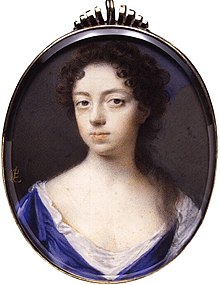Analysis of Part of the Fifth Scene in the Second Act of Athalia
Anne Kingsmill Finch 1661 – 1720 (Westminster)
Enter, as in the Temple of Jerusalem,
ATHALIA, MATHAN, ABNER
[Mathan]
WHY, to our Wonder, in this Place is seen,
Thus discompos'd, and alter'd, Juda's Queen?
May we demand, what Terrors seize your Breast,
Or, why your Steps are to this House addrest,
Where your unguarded Person stands expos'd
To secret Foes, within its Walls inclos'd?
Can it be thought that you remit that Hate?
[Athalia]
No more! but Both observe what I relate:
Not, that I mean (recalling Times of Blood)
To make you Judges of the Paths I trod,
When to the empty'd Throne I boldly rose,
Treating all Intercepters as my Foes.
'Twas Heav'ns Decree, that I should thus succeed,
Whose following Favour justifies the Deed,
Extending my unlimited Command
From Sea to Sea o'er the obedient Land:
Whilst your Jerusalem all Peace enjoys,
Nor now the' encroaching Philistine destroys,
Nor wandring Arab his Pavilion spreads,
Near Jordan's Banks, nor wastes his flow'ry Meads.
The great Assyrian, Terror of your Kings,
Who bought his Friendship with their holiest Things,
Yields that a Sister, of his pow'rful Race,
Should sway these Realms, and dignify the Place.
Nor need we add the late insulting Foe,
The furious Jehu does this Sceptre know,
And sinks beneath the Load of conscious Fears,
When in Samaria he my Actions hears.
Distrest by Foes, which I've against him rais'd,
He sees me unmolested, fix'd, and pleas'd;
At least, till now thus glorious was my State;
But something's threatned from relaxing Fate,
And the last Night, which should have brought me Rest,
Has all these great Ideas dispossest.
A Dream, a Vision, an apparent View
Of what, methinks, does still my Steps pursue,
Hangs on my pensive Heart, and bears it down
More than the weight of an objected Crown,
My Mother (be the Name with Rev'rence spoke!)
Ere chearful Day thro' horrid Shades had broke,
Approach'd my Bed, magnificent her Dress,
Her Shape, her Air did Jesabel confess:
Nor seem'd her Face to have refus'd that Art,
Which, in despight of Age, does Youth impart,
And which she practis'd, scorning to decay,
Or to be vanquish'd ev'n in Nature's way.
Thus all array'd, in such defying Pride
As when th' injurious Conqu'ror she descry'd,
And did in height of Pow'r for ill-got Pow'r deride.
To me she spake, these Accents to me came:
"Thou worthy Daughter of my soaring Fame,
"Tho' with a more transcendent Spirit fill'd,
"Tho' struggling Pow'rs attempt thy Life to shield,
"The Hebrew's God (Oh, tremble at the sound!)
"Shall Thee and Them, and all their Rights confound.
A pitying Groan concludes, no Word of Aid.
My Arms I thought to throw about the Shade
Of that lov'd Parent, but my troubled Sight
No more directed them to aim aright,
Nor ought presented, but a heap of Bones,
For which fierce Dogs contended on the Stones,
With Flakes of mangled Flesh, that quiv'ring still
Proclaim'd the Freshness of the suffer'd Ill;
Distain'd with Blood the Pavement, and the Wall,
Appear'd as in that memorable Fall–
[Abner]
Oh! just avenging Heaven!– [aside.
[Mathan]
Sure, Dreams like these are for Prevention given.
| Scheme | xa Bccddxde xexxffgghhiixxjjkkllxxxxeeddmmnnooppqqrrsdsttxxuuvvxdwwxxyy ad Bb |
|---|---|
| Poetic Form | |
| Metre | 101001010100 01001010 10 11101001111 1101011 1101110111 111111111 1101010101 110101111 1111110111 0100 1111011101 1111010111 1111010111 110111101 1011111 1101111101 110011001 0101010001 111110001001 1101001101 1100101001 111010101 110111111 01010010111 11110111001 110101111 111101001 1111010101 0100111101 0101011101 1001011101 111110111 111010101 11111100111 110110101 0011111111 11110101 0101010101 111111101 1111010111 1101110101 110101111 111110111 0111010001 01011101 1101110111 101111101 01111101 11110110101 1101010101 11110100111 01011111111101 1111110111 1101011101 1101010101 11001011111 011110101 1101011101 01001011111 1111110101 1111011101 110101111 1101010111 1111010101 111101111 0101010101 111010001 0110110001 10 11010101 10 11111101010 |
| Closest metre | Iambic pentameter |
| Characters | 3,092 |
| Words | 526 |
| Sentences | 20 |
| Stanzas | 5 |
| Stanza Lengths | 2, 8, 59, 2, 2 |
| Lines Amount | 73 |
| Letters per line (avg) | 33 |
| Words per line (avg) | 7 |
| Letters per stanza (avg) | 475 |
| Words per stanza (avg) | 104 |
Font size:
Submitted on May 13, 2011
Modified on March 05, 2023
- 2:49 min read
- 109 Views
Citation
Use the citation below to add this poem analysis to your bibliography:
Style:MLAChicagoAPA
"Part of the Fifth Scene in the Second Act of Athalia" Poetry.com. STANDS4 LLC, 2024. Web. 16 May 2024. <https://www.poetry.com/poem-analysis/3276/part-of-the-fifth-scene-in-the-second-act-of-athalia>.


Discuss this Anne Kingsmill Finch poem analysis with the community:
Report Comment
We're doing our best to make sure our content is useful, accurate and safe.
If by any chance you spot an inappropriate comment while navigating through our website please use this form to let us know, and we'll take care of it shortly.
Attachment
You need to be logged in to favorite.
Log In